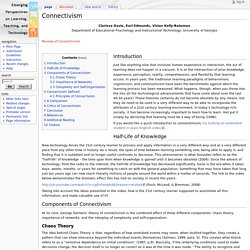

Professor - web design - at The Art Institute of Dallas
Social Media. Conectivismo-videos. Graduate Program in Training and Development @ Roosevelt University. Connectivism: A new learning theory? Guest Blogger: Barry I came across the term Connectivism coined by George Siemens while doing research for TRDV 499 Master paper. The concept is interesting, giving thought to the digital era and how we learn.
Stephen's Web ~ Stephen's Web. Welcome to Connectivism! — Connectivism. CoP: Best Practices. By Etienne Wenger [Published in the "Systems Thinker," June 1998] You are a claims processor working for a large insurance company.

You are good at what you do, but although you know where your paycheck comes from, the corporation mainly remains an abstraction for you. The group you actually work for is a relatively small community of people who share your working conditions. It is with this group that you learn the intricacies of your job, explore the meaning of your work, construct an image of the company, and develop a sense of yourself as a worker. You are an engineer working on two projects within your business unit. Collective Intelligence? Nah. Connective Intelligence ~ Stephen's Web ~ by Stephen Downes. This is exactly right: "(Surowiecki) makes the point that people do not think together in coming to certain conclusions, but rather than people think on their own and the value of the collaborative comes in the connection and combination of ideas.

Each person retains their own identity and ideas, but they are shaped and influenced by the work of others. The concept here is related somewhat to Stephen Downes' discussion of groups vs. networks. At stake in these discussions (Surowiecki, Downes, de Kerchove) is how we are to perceive the individual in a world where the collaborative/collective is increasingly valued. " That is why I, too, prefer the concept of connective (not collective) intelligence.
I also agree with Siemens that the difference will become more vital over the years: "For reasons of motivation, self-confidence, and satisfaction, it is critical that we can retain ourselves and our ideas in our collaboration with others. Jo Bloggs: Connectivism and Communities of Practice. The term Knowledge Management has traditionally referred to ongoing efforts to harness explicit and tacit knowledge within an organisation while 'organisational learning' tends to be more focussed on static efforts to meet specific learning objectives.

Recently, the lines have become blurred to the extent that a merger in strategies should be considered by any organisation serious about harnessing knowledge and promoting learning. Siemens' article, 'Connectivism: A Learning Theory for the Digital Age', discusses the need for 'a theory that attempts to explain the link between individual and organizational learning' (Siemens, 2004).
He expands his theory of networked learning further in his article ‘Connectivism: Learning as Network-Creation’ (Siemens, 2005). I will demonstrate that the theories outlined in Siemens’ two articles are aligned with Wenger’s attempts to rethink learning in the shape of Communities of Practice (CoP). The Future of Education. Jean Lave, Etienne Wenger and communities of practice.
Contents: introduction · communities of practice · legitimate peripheral participation and situated learning · learning organizations and learning communities · conclusion · references · links · how to cite this article Many of the ways we have of talking about learning and education are based on the assumption that learning is something that individuals do.

Connectivism. Connectivism. Clarissa Davis, Earl Edmunds, Vivian Kelly-Bateman Department of Educational Psychology and Instructional Technology, University of Georgia.

Connected Learning. Connectivism: A Learning Theory for the Digital Age. Connectivism: A Learning Theory for the Digital Age December 12, 2004 George Siemens Update (April 5, 2005): I've added a website to explore this concept at www.connectivism.ca Introduction Behaviorism, cognitivism, and constructivism are the three broad learning theories most often utilized in the creation of instructional environments.

Learners as little as forty years ago would complete the required schooling and enter a career that would often last a lifetime. Connectivism: Learning theory of the future or vestige of the past?
Instapaper: Save interesting web pages for reading later. HTML Tutorial. jQuery Fundamentals. jQuery is built on top of JavaScript, a rich and expressive language in its own right.

This section covers the basic concepts of JavaScript, as well as some frequent pitfalls for people who have not used JavaScript before. While it will be of particular value to people with no programming experience, even people who have used other programming languages may benefit from learning about some of the peculiarities of JavaScript. Here's a simple JavaScript program that adds a message to the page: In the above example, we use a function called log.
This is a helper function that is defined by the JavaScript that powers this site — it is not a built-in JavaScript function. You can try running this program by clicking the and it will copy the code to the built-in editor automatically. It's OK if you don't understand everything that's going on in this program; in the rest of this section, we'll talk about variables, functions, and several other building blocks of JavaScript. Variables Functions. JavaScript Patterns. A guide to the basics of jQuery - Vimperator. Web design, html5/css3, social software, web tools. Learning, networks, knowledge, technology, community. Webstuff 2. Learning, networks, knowledge, technology, community.